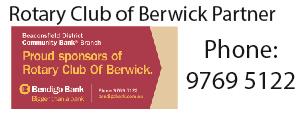
This evening, Assistant Governor, Colin Byron, presented information to our members about some exciting plans that are in
motion for Rotary.
Rotary International is considering a project to address membership, public image, communication, leadership, and
fundraising challenges to help define a more sustainable future for Rotary.
Our region, or Zone 8, which includes Australia, New Zealand, and the Pacific Islands, has been selected as one of two
potential regions from across the globe to pilot a regional approach to governance. It is important that all of us are
consulted throughout this process. In fact, the project cannot proceed without the support of members and clubs.
A local Regionalisation team made up of Rotarians from our zone has identified five key project objectives:
∙Support clubs to engage members, volunteers, and communities
∙Create new attractive leadership roles and development opportunities
∙Build a stronger unified Rotary brand
∙Encourage partnerships
∙Improve efficiencies and reduce duplication.
To help achieve these objectives, the project seeks to develop and test a streamlined governance
approach to:
•Allow clubs sharing geography, culture, and language to organise in ways that suit them.
•Eliminate duplication and remove layers of hierarchy to make Rotary more responsive
and cost effective
•Bring together the best resources from across the region and make them easily
accessible to every club.
•Improve communication effectiveness to enhance club and member engagement.
•Grow membership through new club types, flexibility, and partnership options reflecting
our diversity.
•Attract more community, corporate, and government sector support by communicating
with one voice.
•Enhance leadership and personal development activities to better suit our modern
world.
•Foster more diverse perspectives in decision making.
•Reduce the burden of administrative responsibilities placed upon leaders.
The overarching aim of this project is to provide better and more direct support to Rotary and
Rotaract clubs through a less layered and more devolved contemporary approach. In addition to
potentially releasing members time for humanitarian service by reducing administrative duplication,
any new structure must foster more vibrant club environments and provide doable and attractive
roles accessible to all potential Rotary leaders.
Changing volunteer needs and ageing demographics demand new opportunities for innovation and
collaboration in the ways we serve our communities, enjoy fellowship, engage participants, develop
leaders, and grow Rotary. The time has come to address some of our most persistent challenges in
ways that are more impactful, relevant, and attractive to future generations who share our passion
for service and leadership.
A local project team first looked at ways to reorganise 10 years ago. Building on that groundwork, the
current local project team, which commenced in February 2019, has surveyed members, identified
key issues, established working groups, and considered a proposal by Rotary International’s Shaping
Rotary’s Future Committee (SRF).
In February 2022 the Board of RI endorsed us as being a pilot. The Council on Legislation [CoL]
approved for our Zone to be a pilot earlier this year. The next step is to reach an agreement, via a
voting process, initially of all our Clubs and then our Districts, during September, with the final
decision being put forward by 1st October 2022.
So what is this new governance approach?
To meet future challenges, it is believed we need an approach that recognises the central role of
members, clubs, projects, and programs relative to impact, reach and engagement. An approach that
works with groups of clubs or other collaboration configurations based on affinity, modern
volunteering, and leadership expectations. One voice marketing and national partnerships for greater
fundraising and membership growth are also envisaged essentials, as is access to the best support
available to help clubs evolve and be attractive to both new and mature generations.
RI’s Shaping Rotary’s Future Committee has provided a ‘framework’ for us to explore, test and
develop. It allows for Australia, New Zealand, and the Pacific Islands to be governed by a Regional
Council that would lead and manage regional operations with the assistance of vibrant committees
and specialists supporting clubs to address the challenges we all face. It is envisaged that the role of
the Regional Council would be to strategically lead and manage the activities of the region, whilst
recognising the nuances and requirements of the different countries, territories, and states, set
membership dues and govern Rotary in our region.
Work has already commenced to explore the framework with key stakeholders. Final aspects, which
are yet to be determined, will be developed and piloted in full consultation with members, clubs, and
districts both prior to and during the pilot.
Other important facts, should the pilot proceed, are:
• Existing Districts will remain in place with District Governors and the Regional Council
sharing management and leadership. District personnel will be crucial to ensure continuity
and support for clubs.
• The Districts will remain in overall control of the direction of the pilot with District
Governors playing an important leadership and advisory role during the pilot.
• Regular monitoring and evaluation will occur to confirm effectiveness and efficiency and
that we improve the overall membership experience, grow Rotary and Rotaract, create
opportunities for leadership growth and welcome more diverse perspectives in decision
making.
• Decisions on any permanent change will be subject to approval by the RI Board, after
consultation with Districts and members.

